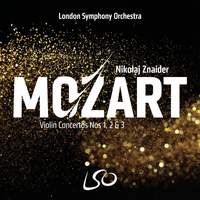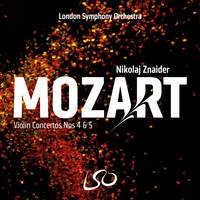Interview,
Nikolaj Szeps-Znaider on Mozart
 Danish violinist and conductor Nikolaj Szeps-Znaider came to international prominence after winning the Carl Nielsen International Music Competition in 1992 at the age of 16, and is presiding over this year’s contest, which began last week in Odense and runs until March 31st. I spoke to him at the end of last year about the changes he’s made to the competition since taking the reins, and about his recent recordings of the complete Mozart violin concertos with the London Symphony Orchestra.
Danish violinist and conductor Nikolaj Szeps-Znaider came to international prominence after winning the Carl Nielsen International Music Competition in 1992 at the age of 16, and is presiding over this year’s contest, which began last week in Odense and runs until March 31st. I spoke to him at the end of last year about the changes he’s made to the competition since taking the reins, and about his recent recordings of the complete Mozart violin concertos with the London Symphony Orchestra.
The violin concertos were written in a short space of time, whilst Mozart was still very young, with Nos. 3, 4 and 5 having established more of a foothold in the repertoire than the first two: do you feel that there’s much development of style over the course of the five works?
A little, yes - though I hasten to say I don’t like the early ones less! I think they’re incredibly inventive, full of beautiful music, and certainly not easier in any respect: they’re actually quite awkward in places, and the first one in particular is pretty demanding. As to evolution of style, it’s true that when you get to the Fifth Concerto the music does go a little deeper in terms of the use of wind instruments in particular: it’s very slight, but I certainly sense hints of what’s to come in works like Don Giovanni sixteen years later.
I notice that for Round Three of the Carl Nielsen Competition (of which you're now president) the jury have asked candidates to choose from Nos. 3, 4 and 5 – was that partly because these tend to be the ones in young players’ repertoire?
I think it was simply to do with preparation-time for the orchestra: that’s just the logistics of holding three competitions simultaneously. If it was solely down to me, I would have accepted any Mozart concerto! But yes, certainly every violinist has played at least one of the last three by their late teens; the first one I learned was No. 3, and I can’t have been more than nine or ten, but I think I was in my early teens the first time I played it in public with an orchestra.
What are the pros and cons for you of directing these works from the violin rather than performing them with a conductor?
There are some things that are more challenging, just in terms of the practical aspects, and others that are at best very rewarding. Directing from the violin gives you a certain feeling of responsibility for the orchestra, which should be present even with a conductor, but removing that figure does result in a more collaborative process. I thought it was a special project all round: there’s something about recording all of the concertos that makes you delve into the scores more deeply, and think more carefully about what you actually want to say. It’s a little like putting a comma in your life: modern-day concertising is kind of antithetical to that, so setting yourself goals can be very useful. It’s similar to teaching yourself, in that you start listening to yourself objectively and asking all kinds of uncomfortable questions, and I think that’s very healthy!
How much was the LSO string section pared down for this project?
We used eight first and eight second violins, six violas, six cellos, and two basses. The crucial thing for me in Mozart is really the number of basses: whether you have eight violins or ten is really neither here nor there, but whether you have two basses or three makes a huge difference. I just conducted Die Zauberflöte in Dresden with two basses: I don’t think you need more.
How did your relationship with the orchestra begin, and how has it developed over the years?
The first time I played with the orchestra was in the late 1990s or perhaps early 2000s, on a tour to Japan with Rostropovich conducting, and I remember that there was an instant chemistry both on- and off-stage. Then I came back to do some concerts with Sir Colin Davis around fifteen years ago, and from then on I started playing with them every year…It’s a very loyal orchestra, which I think is very touching, as well as a sound way to go musically! I started conducting them seven or eight years ago, and remembered Colin saying he wanted to record the Mozart concertos with me and the orchestra; we never got to do it (the only concerto we recorded together was the Elgar), so that was really the starting-point for this project.
You play a Guarneri which was once owned by Fritz Kreisler: does it have any special qualities which make it particularly suited to Mozart?
The main thing is that it speaks without a lot of right-hand pressure: with some Guarneris you have to really dig in, and that doesn’t really work with Mozart, but this violin speaks freely and rings evenly without any pressure being applied. That’s such an important quality for any repertoire from before the mid-nineteenth century.
We touched earlier on the Carl Nielsen International Competition, which you won in your teens – how much has it changed since your victory, and what's your philosophy on competitions in general?
When they called and asked me to become president, my initial response was ‘Absolutely not!’. But then I reflected on it and thought: ‘Those things that I don’t care for which have become part and parcel of the competition as we know it...what if they were to be done differently?’. I went back to them and said: ‘I have two conditions: one is that I don’t want to have teachers on the violin jury, and the other is for the competition to offer the winner as close to a career start as we possibly can’. Of course big prize-money and all of that is important, but the main thing I wanted to do was to actually expand the platform of the competition. And they agreed!
It’s difficult to find a violin jury with people who aren’t teachers, but I wanted to take away the possibility of having somebody there who might subconsciously have a vested interest in one candidate over another. The human brain is infinitely suggestible: we know from countless studies that if you prime it in a certain way it will think one thing, and if you prime it in another then it will think another, and I’m not ashamed to admit that I saw that in myself during the first competition I ever sat and listened to from beginning to end. I thought I knew a lot about violin-playing, but there were so many instances where I wasn’t sure - and then some coach would say one thing and somebody else would say another…and that made sense too! I’m not pretending that we’re going to come up with an objective result, but at the end of the day it IS a competition and we are looking for a winner! So our solution was to have all kinds of people from different areas of musical life - myself, orchestral managers, concert-masters – but, crucially, all people who don’t teach the violin!
Nikolaj Znaider (violin/director), London Symphony Orchestra
Available Formats: SACD, MP3, FLAC, Hi-Res FLAC
Nikolaj Znaider (violin/director), London Symphony Orchestra
Available Formats: SACD, MP3, FLAC, Hi-Res FLAC




